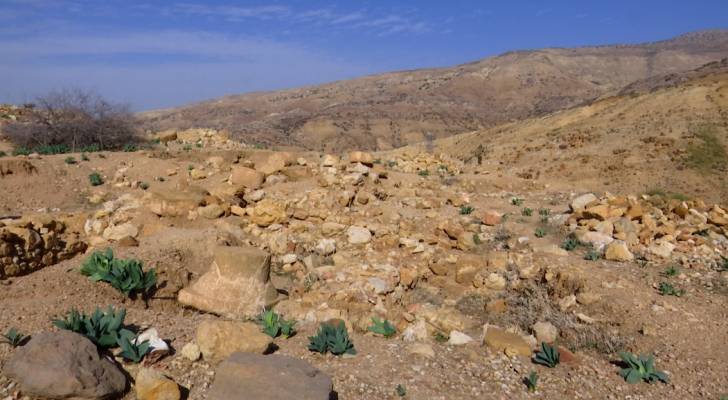Tulul adh-Dhahab archaeological site in the central Jordan Valley.
Researchers deny claims of “Israelite” palace in Jordan
Two weeks after Hebrew news outlets published claims of an “Israelite” palace in the Tulul adh-Dhahab archaeological site of Deir Alla in the central Jordan Valley, researchers specializing in archaeology have rejected the allegations, citing scientific evidence.
Read more: Jordan condemns maps published by official “Israeli” social media accounts
A team from Roya visited the archaeological site, accompanied by specialized researchers and officials from the Department of Antiquities, to debunk the claims.
Dr. Zaidan Kafafi, an expert in archaeology, explained that Tulul adh-Dhahab, where the alleged “Israelite” palace was claimed to be, was, according to available archaeological evidence, a defensive or protective outpost of the Ammonites. This is supported by remnants from that period.
Kafafi added that Tulul adh-Dhahab/Deir Alla was the only crossing that linked the western part of the Jordan River with the mountainous region on the eastern side before the construction of the Roman road.
This, he stated, provides sufficient evidence that the archaeological site in Tulul adh-Dhahab was an Ammonite fortification.
Kafafi’s excavation experience in neighboring sites, including Deir Alla and Tel al-Dami, further confirms that all the findings are related to the Ammonite civilization, with no indication of any connection to the tribe of Gad (One of the Twelve Tribes of “Israel”).
Dr. Omar Al-Ghul, a researcher at Yarmouk University, commented that these "Israeli" claims reveal two major flaws in both academic and political practices.
Academically, Al-Ghul noted that "Israelis" tend to focus on specific archaeological periods while disregarding others, which he believes is unscientific and distorts history.
He added that no texts or written evidence had been discovered in Tulul adh-Dhahab to indicate the precise cultural identity of the site.
Read more: Qatar denounces expansionist Israeli Occupation map
Politically, Al-Ghul pointed out that “Israeli” politicians often seize any statement from archaeologists to use it politically and assert territorial claims over archaeological sites.
Aktham Oweidi Al-Abadi, Assistant Director-General for Technical Affairs at the Department of Antiquities, stated that excavation operations at potential archaeological sites are strictly regulated by legal guidelines and are under direct supervision of the Department. "We will not allow any Israeli to conduct excavations in Jordan under any circumstances," he affirmed.
Al-Abadi added that the Department often deals with researchers with ulterior motives, attempting to impose narratives from the Torah on archaeological sites, which he said contradicts both the truth and scientific evidence.




